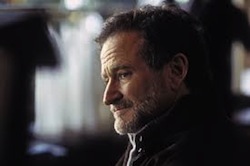Let’s imagine we’re all sitting in a room together and someone says, “Raise your hand if you love Robin Williams.” We would probably all raise our hands. Then, “Raise your hand if someone in your family or a family you know struggles with mental illness,” we would probably again all raise our hands — although with much more hesitation.
 The media’s desperate attempt to uncover a cause for his suicide — say, financial or relationship problems — is astonishingly naive. What caused Williams to end his life is unknowable, no matter how exhaustive the investigation. What is knowable, from media reports, is that Williams wrestled the beast of a mood disorder — depression, and the early stages of Parkinson’s disease. And he was very open about his struggles with chemical dependency. That’s a very dangerous cocktail.
The media’s desperate attempt to uncover a cause for his suicide — say, financial or relationship problems — is astonishingly naive. What caused Williams to end his life is unknowable, no matter how exhaustive the investigation. What is knowable, from media reports, is that Williams wrestled the beast of a mood disorder — depression, and the early stages of Parkinson’s disease. And he was very open about his struggles with chemical dependency. That’s a very dangerous cocktail.
Life is full of tripwires, from the mundane to the major. If you have a mental illness, whether bipolar disorder, schizophrenia, major depression, or a variety of other disorders, any of life’s circumstances can trigger an episode. We cannot know what ignited his brain’s vulnerabilities. That’s his to know.
An Aug. 11 New York Times article tells us that Williams was the privileged son of a Detroit auto executive who grew up chubby and lonesome playing by himself with 2,000 toy soldiers in an empty room of a suburban mansion. Oh, to have been a soldier in that room!
Through his originality and lightning improvisations, the way he played his roles, his comedic routines, we know he was a creative genius. The feature article of the June Atlantic Monthly, “Secrets of the Creative Brain,” by neuroscientist Nancy Andreasen, sheds light on why mental illness so often accompanies creativity.
Andreasen’s research shows that creative geniuses like to teach themselves from an early age and are often misfits in the education system (think: Michael Dell, Bill Gates, Steve Jobs, Mark Zuckerberg, all of whom never finished college). They have many deep interests; they are highly persistent in the face of rejection; and above all, they excel at making connections.
According to research done by Johns Hopkins psychologist Kay Redfield Jamison and Harvard psychiatrist Joseph Schildkraut, mood disorders and a strong family history of mental illness tend to occur with creative genius, especially among writers and painters. Hugely successful, creative people with crushing personal histories ending in suicide include Bertrand Russell, Albert Einstein, Sylvia Plath, Ernest Hemingway, James Joyce, Kurt Vonnegut, Vincent van Gogh, Mark Rothko, and the list goes on and on. Like Williams, many were as funny and lovable as they were tormented and often end their own lives.
The link between mental illness and the creative genius that has made our world so much more livable and enjoyable is so strong that it has been suggested we withhold treatment. A more sane suggestion was made recently on the PBS NewsHour by Mark Vonnegut, a pediatrician with schizophrenia and son of Kurt Vonnegut. He suggests that we do a better job of taking care of each other, that among the homeless veterans we see on the streets may be another Van Gogh.
There’s more than the abject sadness we feel with Williams’ death. There’s also hope and inspiration. Despite his mental illness and chemical dependency, Williams worked nonstop and was known for his reliability and dependability. And, according to the Times article, he displayed none of the traits of troubled actors such as showing up late, forgetting the lines or flaring tempers. His 20 years of sobriety after his cocaine habit in the 1980s also is inspiring.
We tend to think that suicide is rare. It is not rare. Mental illness is not rare. There is help out there. Call 800-273-TALK (8255) or visit suicidepreventionlifeline.org, afsp.org or alcoholrehabhelp.org.
Inglis served on the Board of Trustees of Austin Travis County Integral Care (formerly ATC Mental Health Mental Retardation) for 13 years.

 Austin, Texas
Austin, Texas